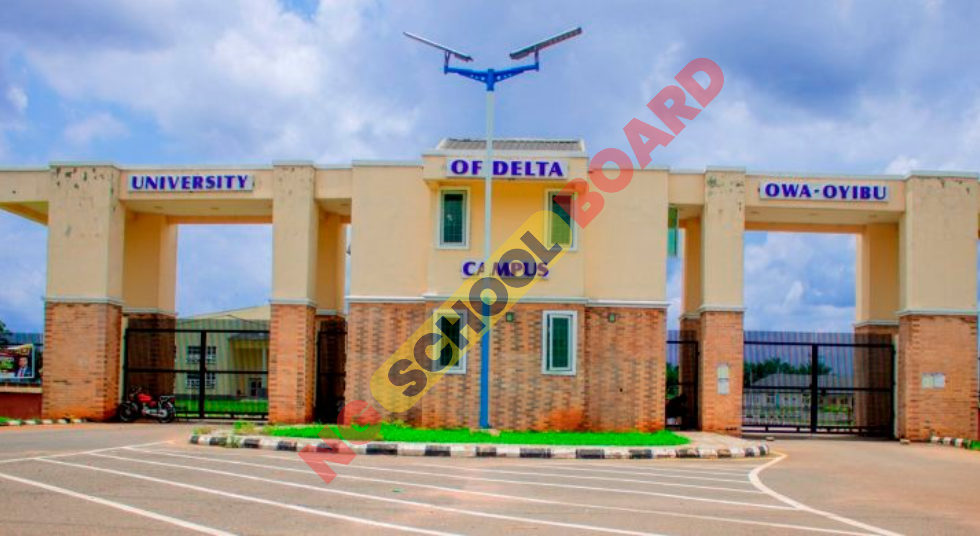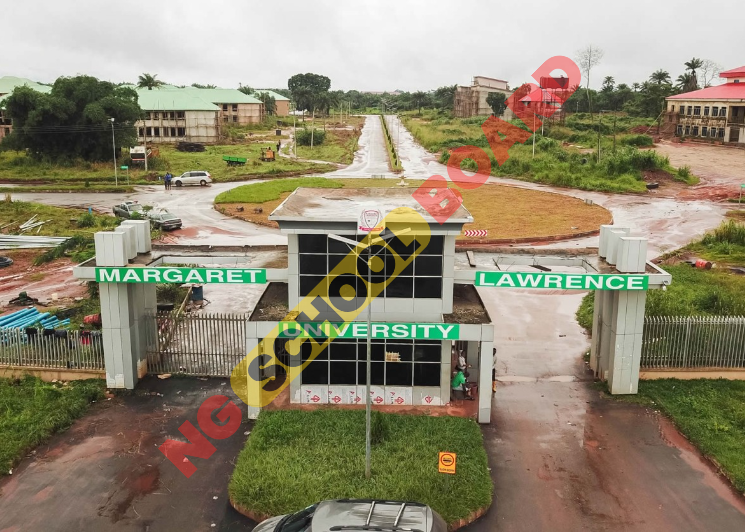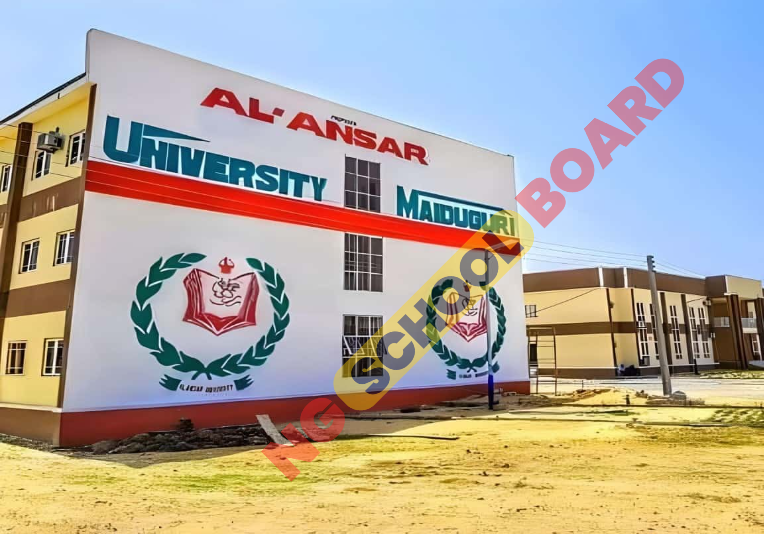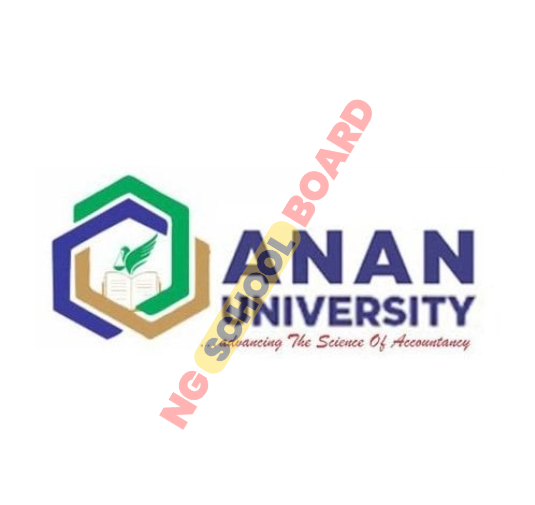Popular Courses at the University of Delta
The University of Delta (UNIDEL), located in Abraka, Nigeria, is one of the top universities in the country. With a student population of over 30,000, UNIDEL offers a wide range of undergraduate and postgraduate degree programs across various faculties.

ALSO SEE:
University of Delta School Fees
Delta State University School Fees
15 Reasons Why Employers Love Foreign Graduates
Which University Has The Lowest Cut-Off Mark For Nursing
How To Write Application Letter Example
10 Simple Applications for Teaching Jobs
University of Delta Courses Offered
| Faculty | Courses Offered |
|---|---|
| Faculty of Agriculture | – Agricultural Economics and Extension – Agricultural Science and Education – Animal Science – Fisheries and Aquaculture – Forestry and Wildlife Management |
| Faculty of Arts | – Christian Religious Studies – English and Literary Studies – History and International Studies – Linguistics – Mass Communication – Philosophy – Theatre Arts |
| Faculty of Education | – Adult and Continuing Education – Educational Administration and Planning – Guidance and Counselling – Integrated Science Education – Primary Education – Special Education |
| Faculty of Engineering | – Chemical Engineering – Civil Engineering – Electrical/Electronics Engineering – Mechanical Engineering – Petroleum Engineering |
| Faculty of Law | – Law |
| Faculty of Management Sciences | – Accounting – Banking and Finance – Business Administration – Economics – Entrepreneurship – Marketing – Public Administration |
| Faculty of Science | – Biochemistry – Biology – Botany – Chemistry – Computer Science – Environmental Science – Geology – Industrial Chemistry – Mathematics – Microbiology – Physics |
| Faculty of Social Sciences | – Criminology and Security Studies – Geography and Regional Planning – Political Science – Psychology – Sociology |
| Part-Time Studies | – Pre-degree programme – Joint Universities Preliminary Examination Board (JUPEB) – Diploma programme – Extramural programme – Adult Education and Certificate in Law |
For a complete list of courses offered by the University of Delta, please visit the university’s website: University of Delta
Some of the most popular courses at UNIDEL include:
Faculty of Agriculture
The Faculty of Agriculture at UNIDEL is home to six departments offering courses in various agricultural disciplines. With over 3000 students, this faculty prepares graduates for careers in food production, environmental management, and agribusiness.
Agricultural Economics and Extension
This department focuses on training students in agricultural business management, food policy, rural development, and extension services. Courses cover topics like farm management, agribusiness, agricultural marketing, microfinance, and communication skills. Graduates can work as agricultural economists, farm managers, extension agents, project evaluators, and more.
Agricultural Science and Education
Students learn about crop and animal sciences, soil management, biotechnology, and how to teach agricultural science. Courses include crop production, livestock production, agricultural education methods, soil chemistry, food science, and more. Graduates are equipped to become agriculturists, teachers, researchers, and agricultural advisors.
Animal Science
The animal science department provides training in animal production, nutrition, breeding, health, product processing, and marketing. Students take courses on monogastric and ruminant nutrition, dairy science, poultry science, animal products and technology, and more. Graduates are prepared for careers in commercial livestock production, animal nutrition, meat and dairy processing, animal health services, and teaching.
Fisheries and Aquaculture
This program focuses on sustainable fish farming, fisheries management, post-harvest technology, and aquatic resource conservation. Courses cover fish biology, water quality management, fish feed formulation, fish diseases, aquaculture systems, hatchery operations, fishing technology, and more. Graduates can work as fisheries officers, fish farmers, aquaculture technicians, fish inspectors, and lecturers.
Forestry and Wildlife Management
Students learn about forest ecosystems, silviculture, wildlife ecology, biodiversity conservation, and parks management. Courses include dendrology, silviculture, wildlife management, ecotourism, forest policy, wood science, and more. Graduates are equipped for careers like foresters, wildlife managers, ecotourism planners, timber contractors, lecturers, and conservationists.
Faculty of Arts
With over 5000 students, the Faculty of Arts is UNIDEL’s second largest faculty. It comprises of six departments offering programs in languages, social sciences, and creative arts.
Christian Religious Studies
This department focuses on teaching Christian theology, biblical literature, ethics, and comparative religion. Courses cover Old Testament studies, New Testament studies, systematic theology, Christian ethics, pastoral studies, and African traditional religion. Graduates can work as pastors, youth leaders, religious educators, counselors, and researchers.
English and Literary Studies
Students learn about English language proficiency, linguistics, literary analysis, creative writing, editing, and communication. Courses include English syntax, phonology, morphology, semantics, pragmatics, prosody, novel analysis, poetry, dramatic literature, and more. Graduates are prepared for careers in education, publishing, writing, editing, public relations, and media.
History and International Studies
This program provides training in Nigerian history, African history, economic history, international relations, conflict resolution, and diplomacy. Courses cover pre-colonial and colonial African history, historiography, international politics, foreign policy analysis, international law, and more. Graduates are equipped to work as historians, diplomats, policy analysts, international civil servants, researchers, and lecturers.
Linguistics
Students learn about language analysis, sociolinguistics, psycholinguistics, applied linguistics, and communication disorders. Courses include phonetics, phonology, syntax, semantics, first and second language acquisition, sign language, speech disorders, computational linguistics, and more. Graduates can work as linguists, translators, speech therapists, language planners, and lecturers.
Mass Communication
This department focuses on print media, broadcasting, public relations, advertising, and digital media. Courses cover news reporting and writing, photojournalism, broadcasting, PR principles, advertising concepts, media laws and ethics, new media, and more. Graduates are prepared for careers in journalism, broadcasting, PR, advertising, social media management, and communication research.
Philosophy
Students learn critical thinking, logic, ethics, metaphysics, epistemology, and the history of ideas. Courses include introduction to logic, ancient and modern philosophy, ethics, philosophy of religion, African philosophy, and contemporary issues. Graduates are equipped to work as teachers, social critics, ethicists, researchers, consultants, and in various public service roles.
Theatre Arts
This program covers acting, directing, production design, playwriting, choreography, arts management, and technical theatre. Courses include acting techniques, directing concepts, stage design, lighting design, play analysis, dance forms, arts marketing, and more. Graduates can work as actors, directors, producers, choreographers, production managers, and lecturers.
Faculty of Education
With over 8000 students, the Faculty of Education is UNIDEL’s largest faculty. It offers teacher education programs across six departments. Graduates qualify as professional educators in various subjects and levels.
Adult and Continuing Education
This department focuses on training adult educators to design and deliver continuing education programs. Courses cover adult learning theories, program planning, teaching methods, counseling, evaluation, and distance education. Graduates can work as adult literacy instructors, workplace trainers, community educators, and learning program developers.
Educational Administration and Planning
Students learn about school organization, education policy, project management, budgeting, and strategic planning. Courses include educational planning, economics of education, school management, supervision, education law, financial administration, and more. Graduates are prepared for administrative and managerial roles in schools, colleges, education agencies, and corporate training units.
Guidance and Counselling
This program provides training in counselling theories, psychology, career guidance, special education needs, and social work principles. Courses cover counselling skills, learning disabilities, career counseling, child psychology, psychometrics, family therapy, and more. Graduates are equipped to work as school counsellors, career advisors, social workers, mental health counsellors, and life coaches.
Integrated Science Education
Students take courses in biology, chemistry, physics, mathematics, and science education pedagogy. Key courses include general biology, general chemistry, general physics, algebra, trigonometry, methodology of science teaching, educational technology, and more. Graduates qualify as integrated science teachers at the basic education level.
Primary Education
This department focuses on training quality primary school teachers across core subjects like English, mathematics, social studies, and creative arts. Courses cover primary education foundations, curriculum design, instructional methods, classroom management, educational psychology, and teaching practice. Graduates teach various subjects at the primary level.
Special Education
The program provides skills to teach learners with special needs including visual, hearing, intellectual, or learning disabilities. Courses include psychology of exceptional children, autism spectrum disorders, assistive technology, communication disorders, assessment and placement, instructional adaptation, and more. Graduates work as special education teachers, instructional aides, and disability specialists.
Faculty of Engineering
With over 5000 students, the Faculty of Engineering offers accredited programs leading to degrees in major engineering fields. Graduates gain technical and practical skills for building and manufacturing industries.
Chemical Engineering
Students learn about chemical processes, plant design, fluid mechanics, thermodynamics, reaction engineering, and control systems. Courses include mass transfer, separation processes, chemical reaction kinetics, process modeling, instrumentation, process control, and more. Graduates work in petrochemical, food and pharmaceutical industries, research, consulting, and academics.
Civil Engineering
This program focuses on structural analysis, construction, hydraulics, geotechnics, transportation, and environmental engineering. Key courses are structural analysis, steel & concrete design, highway engineering, soil mechanics, hydrology, water & waste management, and more. Graduates work in construction, public works, infrastructure development, building services, and as consultants.
Electrical/Electronics Engineering
Students learn about power systems, control systems, telecommunications, microelectronics, instrumentation, and computer systems. Courses include analog electronics, digital logic design, signals & systems, microprocessors, electromagnetics, power engineering, VLSI design, and more. Graduates work in power, telecom, manufacturing, computer, and other technical industries.
Mechanical Engineering
This department provides training in machine design, thermofluids, manufacturing, control systems, and energy. Key courses are machine design, fluid mechanics, heat transfer, thermodynamics, manufacturing technology, refrigeration & air conditioning, robotics, and more. Graduates find roles in automotive, aviation, energy, and various manufacturing industries.
Petroleum Engineering
Students gain expertise in drilling operations, reservoir analysis, production engineering, project management, and oil & gas transportation. Courses cover petroleum geology, drilling technology, reservoir simulation
engineering, production operations, petroleum economics, hydrocarbon processing, pipeline & storage systems, and more. Graduates are employed in oil & gas exploration, production, services, and pipeline companies.
Faculty of Law
The faculty offers acclaimed programs leading to bachelor’s, master’s and doctoral degrees in law. With over 1500 students, the faculty produces graduates equipped for legal practice, judiciary, business, teaching, and public service.
Law
Students take courses covering key legal subjects like constitutional law, criminal law, business law, international law, jurisprudence, civil procedure, advocacy, and ethics. The curriculum includes torts, family law, labor law, tax law, intellectual property law, evidence law, and more. Extensive moot court sessions provide practical legal training. Graduates can become lawyers, judges, business executives, law lecturers, legal consultants, and government officials. The faculty also offers specialized LLM and PhD degrees.
Faculty of Management Sciences
With over 7000 students, this is one of the largest faculties at UNIDEL. It comprises seven departments offering undergraduate and postgraduate programs in management disciplines. Graduates are prepared for leadership roles in diverse organizations.
Accounting
The accounting department focuses on financial accounting, management accounting, taxation, auditing, and accounting systems. Key courses include financial reporting, cost & management accounting, income tax law, accounting theory, auditing standards, accounting information systems, and more. Graduates work as accountants, auditors, financial analysts, business consultants, and taxation advisors.
Banking and Finance
Students learn about banking operations, investment analysis, corporate finance, financial markets, risk management, and financial regulations. Courses cover commercial banking, development finance, investment banking, financial derivatives, international finance, financial modeling, microfinance, central banking and more. Graduates are employed in banks, investment firms, insurance, stock markets and regulatory agencies.
Business Administration
This broad-based program covers core business disciplines like marketing, human resources, operations, strategy, and entrepreneurship. Key courses are principles of management, organizational behavior, business communication, strategic management, entrepreneurship, international business, ethics, and corporate social responsibility. Graduates gain generalist business skills for managerial roles in diverse industries.
Economics
The economics department focuses on building analytical skills in microeconomics, macroeconomics, econometrics, mathematical economics, development economics, and monetary economics. Courses include intermediate micro & macro, international economics, public finance, environmental economics, labor economics, monetary theory, and econometric methods. Graduates work as economists, policy analysts, researchers, consultants, and lecturers.
Entrepreneurship
Students gain practical knowledge and skills for starting and managing new ventures. Courses cover entrepreneurial mindset, opportunity recognition, business planning, small business management, social entrepreneurship, business leadership, innovation, scaling strategies, and more. Graduates can become entrepreneurs, business consultants, project innovators, and managers in high-growth firms.
Marketing
This program focuses on consumer analysis, marketing communication, branding, pricing, distribution, digital marketing, and marketing analytics. Key courses are principles of marketing, consumer behavior, services marketing, integrated marketing communication, sales management, digital marketing strategy, marketing research, and more. Graduates build marketing careers in consumer goods, telecom, media, marketing agencies, and consulting firms.
Public Administration
Students learn about public policy, government functioning, development administration, nonprofit management, public finance, and human resource management. Courses include policy analysis, public sector management, development management, NGO management, local government administration, public budgeting, administrative law, and more. Graduates work in the civil service, local government, policy think tanks, nonprofits, and international development organizations.
Faculty of Science
With over 6000 students across twelve departments, the Faculty of Science offers a wide range of programs in physical sciences, life sciences, earth sciences and mathematics. Graduates pursue diverse science careers and higher studies.
Biochemistry
This program focuses on advanced biological chemistry, metabolism, nutrition, toxicology and analytical methods. Key courses are general biochemistry, nutrition, metabolic regulation, clinical biochemistry, enzyme & protein biochemistry, nucleic acids, spectroscopy, chromatography, and more. Graduates are equipped for careers in healthcare, food, pharmaceutical and biotechnology industries, and research.
Biology
Students take foundational courses in botany, zoology, ecology, cell biology, genetics, physiology, immunology, and evolutionary biology. The program includes molecular biology, microbiology, parasitology, entomology, developmental biology, biostatistics, and biodiversity conservation. Graduates can work as researchers, academics, clinical lab technicians, environmental analysts, science writers, and teachers.
Botany
This department focuses on plant biology, plant diversity, plant physiology, ecology, genetics, biotechnology, and economic botany. Courses cover taxonomy, plant anatomy, plant propagation, cell & tissue culture, phytochemistry, plant pathology, ethnobotany, and more. Graduates are hired in agriculture, horticulture, forestry, plant biotechnology, academics, herbal products, and botanical gardens.
Chemistry
Students gain extensive lab training in organic, inorganic, analytical, and physical chemistry. The program covers spectroscopy, electrochemistry, reaction mechanisms, nanomaterials, quantum chemistry, and biochemistry. Graduates are prepared for industrial roles, graduate studies, and research in fields like petrochemicals, pharma, semiconductors, consumer goods, and more.
Computer Science
This department focuses on software engineering, programming, data structures, algorithms, databases, operating systems, computer networks, artificial intelligence, and computer architecture. Key courses are data structures, object oriented programming, database systems, computer organization, operating systems, software engineering, machine learning, and more. Graduates build careers in IT services, technology companies, and computer hardware manufacturing.
Environmental Science
Students learn about ecological systems, natural resource management, pollution control, environmental toxicology, waste management, energy and sustainability. Courses include ecology, environmental chemistry, remote sensing, environmental impact assessment, solid & hazardous waste management, renewable energy, and more. Graduates work as environmental scientists, consultants, sustainability managers and researchers.
Geology
This program covers mineralogy, petrology, paleontology, structural geology, hydrogeology, geophysics, geochemistry, engineering geology, and petroleum geology. Key courses are physical & historical geology, mineralogy, petrology, stratigraphy, sedimentology, geophysics, economic geology, and more. Graduates find roles in mining, oil/gas, geotechnical services, natural hazards assessment, academics, and earth science education.
Industrial Chemistry
Students gain applied chemistry skills tailored for process, manufacturing, and production environments. Courses include industrial chemical processes, corrosion management, chemical plant design, product development, quality control, occupational safety, and effluent treatment. Graduates work in chemical, food and beverage, oil and gas, plastics, pharma, paint, and consumer goods industries.
Mathematics
This department focuses on building strong fundamentals in calculus, algebra, analysis, geometry, number theory, statistics, and modeling. Courses include advanced calculus, linear algebra, complex analysis, group theory, graph theory, probability, dynamical systems, and more. Graduates work in research, academics, space and defense organizations, finance, data science, and as actuaries.
Microbiology
Students learn about viruses, bacteria, fungi, protists, immunology, microbial genetics, and biotechnology methods. Courses cover general microbiology, pathogenic microbiology, virology, parasitology, microbial physiology, microbial genetics, immunology, epidemiology, and more. Graduates find roles in healthcare, pharmaceuticals, food/beverage quality control, and research.
Physics
The program provides rigorous training in classical mechanics, electromagnetism, optics, thermodynamics, quantum mechanics, astrophysics, electronics, and nuclear physics. Courses include classical mechanics, electromagnetism, quantum theory, statistical physics, astrophysics, solid state physics, nuclear & particle physics and more. Graduates pursue diverse careers in research, engineering, technology, finance, consulting, teaching, and more.
Faculty of Social Sciences
With over 4000 students, the Faculty of Social Sciences comprises five departments offering programs focused on human society and relationships. Graduates develop key skills for roles in the public sector, private organizations, and social services.
Criminology and Security Studies
Students learn about crime analysis, criminal psychology, investigative methods, law enforcement administration, prison studies, emergency response systems, and societal security. Courses cover criminal behavior, criminal profiling, cybercrime, counterintelligence, crisis management, emergency planning, and more. Graduates work in law enforcement, criminal justice, risk management, private security, and homeland security agencies.
Geography and Regional Planning
This program covers geospatial techniques, land use analysis, rural & urban development, disaster management, transportation, population studies, and resource analysis. Key courses are cartography, remote sensing, geographic information systems, urban planning, rural development, environment and development, and more. Graduates find roles in urban planning, resource and tourism management, land administration, and environmental services.
Political Science
Students gain expertise in political theories, public policy, international relations, conflict mediation, civic engagement, and administrative systems. Courses include political thought, public administration, international law, foreign policy, public policy analysis, democracy & governance, and more. Gradu
ates pursue careers in public office, foreign service, policy research, political journalism, teaching, and non-governmental organizations.
Psychology
This department focuses on developmental psychology, social psychology, cognitive processes, psychometric testing, counseling, organizational behavior, and experimental psychology. Key courses are developmental psychology, theories of personality, abnormal psychology, organizational psychology, psychological assessment, counseling psychology, and more. Graduates work as psychologists, counselors, mental health workers, human resource managers, and researchers.
Sociology
Students learn about society, culture, ethnicity, demography, criminology, gender studies, social institutions, and social problems. Courses include introduction to sociology, demography, gender & development, industrial sociology, medical sociology, criminology, social research methods, and more. Graduates find roles in social services, nonprofits, government agencies, think tanks, community development, and teaching.
Part-Time Studies
In addition to full-time undergraduate and postgraduate programs, UNIDEL offers several part-time and professional development courses.
Pre-degree Programme
This one-year program prepares students for undergraduate degree courses by building foundational skills in communications, mathematics, science, and social sciences. Applicants who do not meet direct entry requirements for bachelor’s degrees can enroll in this to qualify for their preferred degree program.
Joint Universities Preliminary Examinations Board (JUPEB)
This is an intensive one-year course that prepares students for entry into accredited Nigerian universities. Students take foundation courses in biology, chemistry, physics, mathematics, and English language. Upon completion, students can apply to degree programs at UNIDEL or other universities based on their JUPEB results.
Diploma Programmes
UNIDEL offers part-time diploma courses in fields like agriculture, management, law, technology, and social work. These 2-year programs provide concentrated training for specific careers. Sample diplomas are Agriculture Health & Extension, Accounting Technicians, Computer Science, Social Work, Criminal Justice, and more.
Extramural Programme
This enables working professionals to study degree courses on a part-time basis. Students can pursue undergraduate degrees at their own pace by taking fewer courses per semester. Extramural students attend classes during evenings, weekends, and semester breaks.
Adult Education & Certificate in Law
Adult learners can pursue short certificate programs to advance their skills. Example offerings are the 1-year Certificate in Law, 1-year Adult Education certificate, and specialized short professional courses. Programs are flexibly scheduled for working adults.
Frequently Asked Questions
Q: How many faculties are there at the University of Delta?
A: The University of Delta has 12 faculties – Agriculture, Arts, Education, Engineering, Law, Management Sciences, Science, Social Sciences, Pharmacy, Environmental Studies, Basic Medical Sciences and Clinical Sciences.
Q: What is the most popular faculty at UNIDEL based on student enrollment?
A: The Faculty of Education is the most popular at UNIDEL with over 8000 students. Programs offered by the Education faculty include Adult Education, Educational Administration, Primary Education, Special Education and more.
Q: Does UNIDEL offer medicine or medical degrees?
A: No, the University of Delta does not currently offer medicine or other clinical health sciences degrees. However, it has proposed opening a College of Health Sciences to offer new programs in medicine, nursing, pharmacy and medical lab sciences in the future.
Q: What specialized postgraduate degree programs are offered at UNIDEL?
A: At the postgraduate level, UNIDEL offers a range of specialized master’s and doctoral degrees such as Master of Laws (LLM), MSc Petroleum Geology, Master of Public Health, PhD English Literature, PhD Chemical Engineering, Doctor of Veterinary Medicine and more.
Q: Does UNIDEL have an MBA program?
A: Yes, the University of Delta offers a Master of Business Administration (MBA) degree through its Faculty of Management Sciences. The MBA program covers core business disciplines and allows students to specialize in areas like Marketing, Finance, Human Resources, or Operations Management.
Q: What is the Pre-degree program at UNIDEL?
A: The Pre-degree is a one-year foundation program for students who do not meet direct undergraduate admission requirements. Applicants enroll in remedial classes in English, Math, Science and Social Sciences before progressing to their preferred bachelor’s degree.
Q: How can working professionals study at UNIDEL?
A: UNIDEL caters to working professionals through its part-time diploma programs, extramural degree programs that allow part-time study, and flexible short certificate courses. These programs are scheduled during evenings, weekends and semester breaks.
Q: Does UNIDEL have an online or distance learning program?
A: As of now, the University of Delta does not offer full online degree programs. However it is expanding its e-learning capabilities, and some faculties like Education have started offering certain courses in online and hybrid formats.

Hello, I’m Emeka by name, an article writer with a passion for words and storytelling. I have a knack for crafting engaging and informative content that captivates readers and delivers valuable insights. Whether it’s exploring the latest trends, sharing knowledge, or diving into creative narratives, I’m here to bring words to life. Join me on a journey through the world of ideas and stories as we explore the power of written expression.





